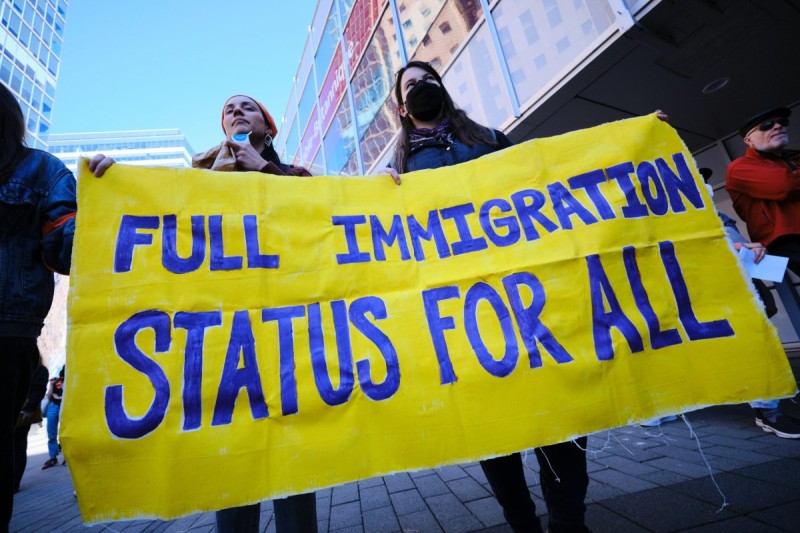Canada’s immigration system and the erasure of artistic labour
Deferred belonging is a wound many artists and scholars know too well

Immigration policy must account for the contributions of artists, scholars, and community builders whose work does not fit neatly into economic categories but whose impact is undeniable. Photo courtesy the Migrant Rights Network.
In 2008, I arrived in Edmonton with a dream: to contribute to Canada through music, teaching, and scholarship. Seventeen years later, I have given this country my most creative years—yet I remain structurally excluded, without permanent residency or citizenship.
This is not an individual failure. It is the outcome of an immigration system that exploits international students and artists, welcoming their labour and creativity while denying them belonging.
Artists are often told their contributions are “intangible.” But in Canada, artistic labour sustains culture, strengthens communities, and generates economic impact. For nearly two decades, I have performed across the country—from citizenship ceremonies in Calgary to community-engaged sound art in Edmonton to international festivals that brought recognition back to Alberta. My compositions have been recognized nationally and internationally. I have taught students at Canadian universities, developed new platforms for cross-cultural understanding, and created projects addressing climate change, Islamophobia, and displacement.
And yet, when I applied for permanent residency, my roles were classified as “clerical work.” The hours of rehearsals, performances, publications, and mentorship were erased in a single bureaucratic stroke. The Canadian immigration system does not know how to account for artistic labour, so it chooses not to count it at all.
In many policy debates, the failure of highly skilled migrants to secure permanent residency is explained away by “non-Canadian” degrees, certifications, or experience. But this rationale does not apply to me. I earned both my PhD and master’s degree in Canada. I taught in Canadian classrooms, curated community projects in Alberta, and was honoured with awards such as the Cultural Diversity Award and a place on the Women in Music Canada Honour Roll. My teaching and performance record spans both Canadian and international stages.
If even this level of contribution and recognition is not enough to secure belonging, then the issue cannot be dismissed as a problem of “foreign credentials.” The systemic barriers run deeper. They lie in a narrow immigration system that refuses to recognize the value of artistic labour, creative scholarship, and community-engaged contributions—even when they are entirely Canadian.
Canada tells international students and artists: “Contribute here. Study here. Work here.” But after years of study and contribution, many of us discover the cruel truth—we were never meant to belong. I applied under the PhD stream, only to be told I was ineligible. I reapplied through Express Entry, but the undervaluation of my work left me short of points. While I taught, performed, and published, my peers with conventional jobs moved smoothly toward permanent residency and citizenship.
This deferred belonging—being welcomed to contribute but not to stay—is a wound many artists and scholars know too well. We give Canada our talent, our vision, our years, and in return we receive precarity, invisibility, and exclusion.
Canada’s immigration policy has shifted to prioritize temporary foreign workers and international students as a source of cheap labour. Universities recruit international students, charging high tuition while offering little in the way of pathways to permanent residency. Artists, meanwhile, are treated as “non-essential” in the system’s rigid occupational categories, despite the fact that our work creates social cohesion, drives cultural diplomacy, and builds Canada’s international reputation.
This is not accidental. Precarity is a feature, not a flaw, of the current immigration system. It ensures that migrants remain dependent, vulnerable, and easily replaceable. It is a system that says: your labour is welcome, your presence is not.
Behind every statistic on international students or temporary workers is a life lived in limbo. In my case, the cost has been years of insecurity, health challenges, and the constant threat of eviction or deportation. It has meant saying no to opportunities abroad, because re-entry was never guaranteed. It has meant watching my peers celebrated, while my contributions were erased.
For many others, the costs are even more severe: suicides among international students, mental health crises among temporary workers, families separated for years because of processing delays. These are not isolated incidents. They are systemic outcomes of policies that treat migrants as expendable.
Canada must recognize that artistic labour is labour. It is intellectual, cultural, and spiritual work that enriches society and deserves structural recognition. Immigration policy must account for the contributions of artists, scholars, and community builders whose work does not fit neatly into economic categories but whose impact is undeniable.
More broadly, Canada must move toward what I call “compassionate citizenship”—a recognition of belonging based not only on economic productivity but on care, contribution, and relationality. Migrants are not temporary bodies to be cycled in and out. We are neighbours, teachers, caregivers, artists, and friends. We are already part of the social fabric.
Seventeen years is long enough to prove belonging. My story is one among thousands. It is time for Canada to acknowledge that structural exclusion of migrants—especially those in the arts—is not only unjust but unsustainable.
The question is not whether I have proven my worth. It is why a country that celebrates diversity continues to deny belonging to those who embody it, keeping artists like me in limbo even as we shape Canada’s cultural future. My academic and artistic labour is valuable—the question is why Canada refuses to recognize it. After 17 years, two Canadian degrees, extensive Canadian experience, regional and national awards, and countless contributions to its cultural fabric, my exclusion is not an oversight. It is a systemic choice.
Dr. Shumaila Hemani is an award-winning ethnomusicologist, composer, and Sufi singer based in Alberta. She earned her PhD and MA in ethnomusicology from the University of Alberta and has taught locally as well as internationally as music faculty with Semester at Sea. Recognized with the Women in Music Canada Honour Roll (2023) and the Edmonton Arts Council’s Cultural Diversity Award (2016), her work bridges performance and social justice. Her writing appears in The Conversation, Arts Desk UK, Encyclopedia of Women and Islamic Cultures, and The Goose. She is the author of Writing in the Wound: A Memoir of Music and Trauma.










